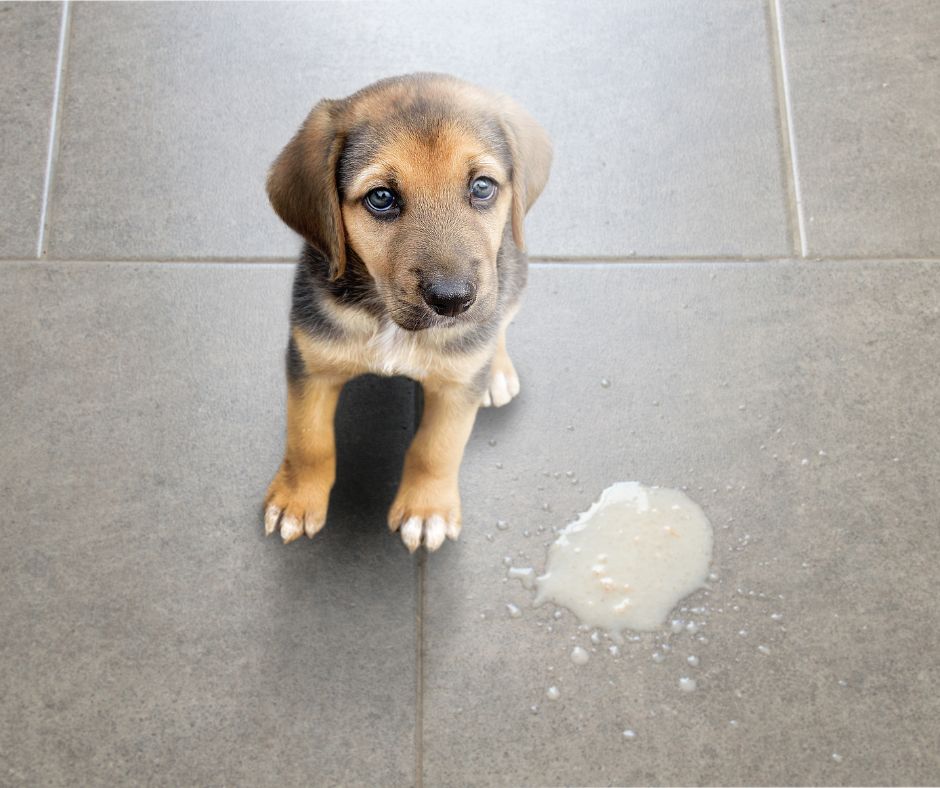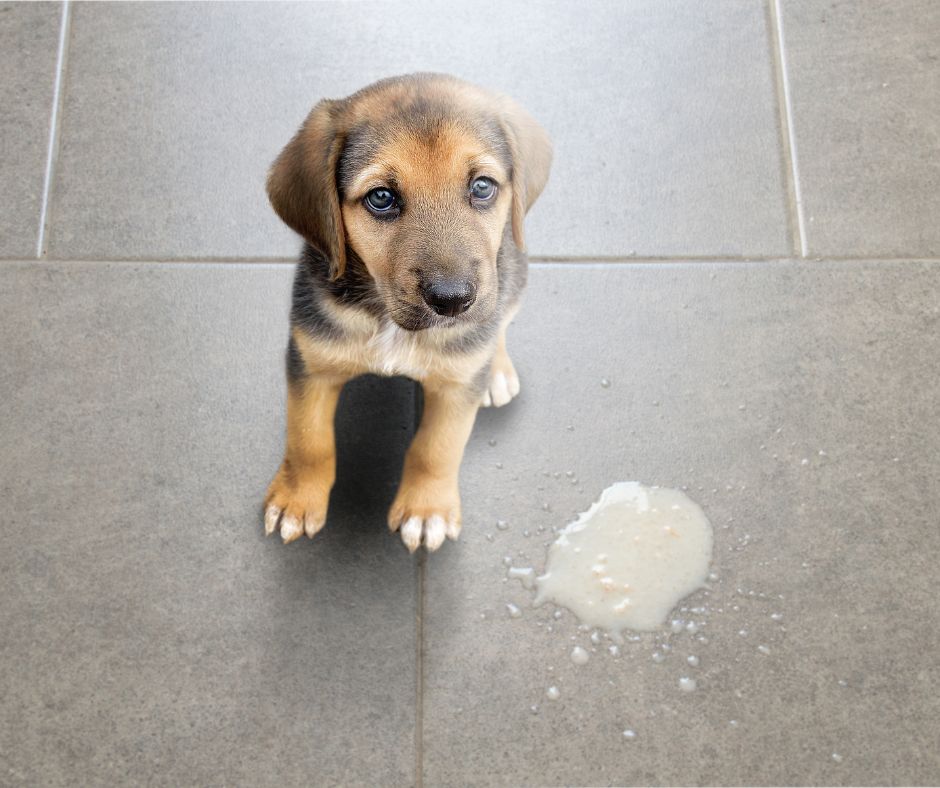 Gastrointestinal problems are some of the leading causes of visits to the vet. Puppies in particular are extremely prone to tummy upsets, which can have various causes. Gastroenteritis is the technical term used to describe an upset tummy and symptoms include vomiting, diarrhoea, poor appetite and, in serious cases, lethargy and collapse. Let’s look at what causes gastroenteritis in puppies.
Gastrointestinal problems are some of the leading causes of visits to the vet. Puppies in particular are extremely prone to tummy upsets, which can have various causes. Gastroenteritis is the technical term used to describe an upset tummy and symptoms include vomiting, diarrhoea, poor appetite and, in serious cases, lethargy and collapse. Let’s look at what causes gastroenteritis in puppies.
Viral infections
The most common viruses that cause gastroenteritis in puppies are parvovirus (also called cat flu), distemper virus and canine coronavirus. Puppies pick up these viruses in the environment and from infected dogs. They are very contagious, which is why it is best to not allow your puppy out of the home or near dogs with an unknown vaccination history until they have completed their full course of puppy vaccinations.
Parvovirus causes the most severe symptoms and is often fatal if not treated aggressively in hospital. Distemper virus infections are less common in well-vaccinated communities; however, distemper can also be fatal. It is accompanied by respiratory tract infections and can progress to seizures at which stage euthanasia is recommended. Canine coronavirus (not to be confused with the human strains of coronavirus causing COVID-19) typically causes less severe illness. Puppy vaccinations are very important to prevent them from getting parvo- and distemper virus infections in particular. Crucially, puppies will only have high levels of immunity against canine parvovirus after the final vaccination at 16 weeks or older. Therefore, your puppy will remain at risk to this infection until after their last shot.
Parasitic infections
Parasites are another very common cause of gastroenteritis in puppies. The two most important microscopic parasitic infections are coccidiosis and giardiasis. Both of these are caused by single-cell organisms that live in the intestinal tract of most dogs. However, puppies do not have as effective an immune system as adult animals do, and will often become ill from these infections. Puppies get these infections from other dogs carrying the parasites and in the case of giardiasis, from an infected environment.
Intestinal worms are considered to be present in all puppies at birth as they often gain access to the puppies while in the mother’s womb as well as through her milk once they are born. The two most common worm infections in puppies are hookworms and ascariasis. These parasites can cause typical gastroenteritis symptoms, but also poor growth, pale gums and a distended abdomen.
Gastrointestinal foreign bodies
Much like human children, puppies will explore their environment by putting everything they can find into their mouths. Foreign objects that are swallowed may be small enough to pass through the entire gastrointestinal tract and out the back end without complications. However, they may also cause a partial or a complete obstruction or blockage of the intestinal tract. Foreign material that is able to move through the intestines may lead to some vomiting, diarrhoea or a poor appetite. Foreign objects stuck in the intestine create a life-threatening situation and need to speedily be surgically removed.
Food change
When puppies are adopted into their new homes, they will usually be given a different diet compared to what they are used to. All animals are prone to diarrhoea if their food is not transitioned gradually. For the first few days, we recommend feeding the puppy the food they are used to eating. Thereafter you can mix 25% of the new food with 75% of the current diet for five days. Then feed 50% of each food for five days. Thereafter feed 75% of the new diet with 25% of the previous diet for five days before changing over entirely to the new food.
Garbage disease
Garbage disease is a term we use to describe gastroenteritis that has occurred as a result of your puppy eating things they shouldn’t be eating. This need not mean just digging in the garbage. It can refer to a puppy eating insects in the garden, picking up bones and scraps of discarded food in the park or even material like grass and leaves. Therefore it is important to put precautionary measures in place to prevent your puppy from accessing rubbish bins and supervise them very closely when taking them on walks.
Dietary indiscretion
Although it may be very tempting to share your snacks with your puppy, it is important to never feed puppies foods that are not designed for them. Human food can contain ingredients that are toxic to dogs such as onion, garlic and xylitol. You should also take care not to overfeed with dog treats. Your puppy must get the majority of their nutrition from a well-balanced dog food. Treats can be given once or twice during the day. If used for training, ensure that the treats you use are as small as possible, so that they do not overeat on them. Remember that by a couple of weeks of age most puppies will have become intolerant of dairy products, so it is not a good idea to give milk to puppies.
When do I go see my vet?
When you get your puppy, take them to the vet as soon as possible for a general health check. The vet can assess your puppy for health problems and help you address them before they become serious. Vaccinations and treatments for worms, ticks and fleas can also be administered if they have not yet been given. At this visit, it is recommended to allow the veterinarian to test for the common intestinal parasites, even if your puppy is not showing symptoms. In this way parasite problems can be addressed before they make your puppy very ill.
Puppies are at higher risk than adult dogs for becoming dehydrated if they are ill. If your puppy has vomited repeatedly and is not eating, you should seek immediate veterinary care. If your puppy has vomited once or twice and has diarrhoea, but is still eating, it is potentially not as serious and emergency treatment may not be necessary. However, any puppy that is showing symptoms of gastroenteritis should be seen by a veterinarian to rule out life-threatening illnesses and give the appropriate treatments. A ‘wait-and-see’ approach is not advised, particularly not with puppies who do not yet have the appropriate defence against illness.
© 2022 Vetwebsites – The Code Company Trading (Pty) Ltd


